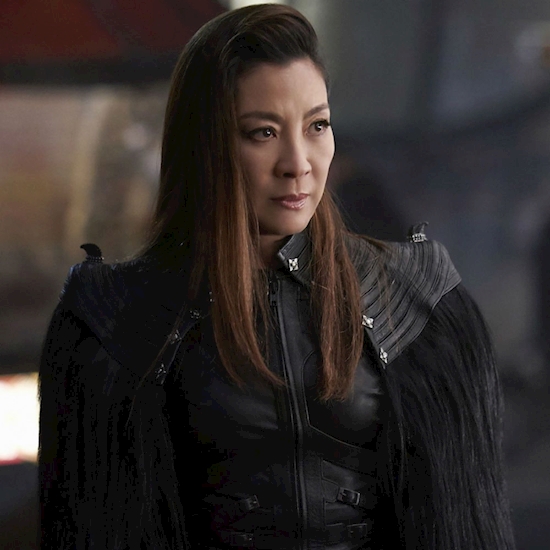Why a Star Trek: Section 31 show isn't a betrayal of Gene Roddenberry's vision
With Star Trek: Discovery renewed for a third season, the iconic Picard (Patrick Stewart) returning in his own limited series and new animated show Lower Decks in the works, the Trek universe is expanding at warp speed.
Perhaps the most intriguing new entry in the Star Trek canon, though, is set to feature Section 31 and Philippa Georgiou's (Michelle Yeoh) mirror doppelganger, with Discovery writers Bo Yeon Kim and Erika Lippoldt as showrunners.
So far, plot details are being kept under wraps but we know the new series will feature the former Terran dictator Emperor Georgiou, since recruited by shadowy black ops organisation Section 31. That's a decision that's proven divisive among Trek purists, with the show possibly following a considerably darker narrative trajectory than previous entries in the franchise. Even the first season of Discovery.
In its sophomore year, the episodic structure and fun-oriented storytelling of Discovery has been informed by Star Trek: The Original Series, with visual allusions to Alex Kurtzman’s cinematic reboots and nods to the more outlandish mythology of Star Wars – and yet the show still has its detractors, panning it for apparently not adhering closely enough to canon.
So a more radical show that revolves around Section 31 was inevitably going to cause upset within the fandom. Section 31 is antithetical to Starfleet’s code of conduct and has previously featured as both a powerful ally and a fearsome foe to trad Trek heroes.
The organisation made its debut in Star Trek: Deep Space Nine as a covert entity that specialised in biological weapons, with a guerilla-style approach to warfare. In prequel Enterprise, they were a grassroots organisation still in their infancy. However, in Star Trek: Discovery, they are a formidable militaristic operation with unlimited resources, similarly light years ahead of anyone else in the Alpha Quadrant.
Controversial they may be, but after early Discovery dipped its toes into these waters, isn’t it about time Trekkies were offered a fully-fledged insight into the morally grey side of the universe? Shouldn’t Star Trek evolve to encompass antiheroes, humans, aliens and those that navigate the queasy areas in-between?
The exciting announcement that Yeoh’s fan-favourite character will have her own show has been met with criticism from those who feel that a Star Trek show exploring the murkier parts of the universe is a betrayal of the franchise's core concept of egalitarian idealism, that Georgiou’s ruthless pragmatism and Section 31’s extreme methods are at odds with the ethos in Gene Roddenberry’s vision of a utopian future.
In Andrew Whalen’s article for Newsweek, he shared his concerns: "While the new series builds from Star Trek: Discovery, following Georgiou’s clandestine work for Section 31, it also represents the fruition of a long-contemplated philosophical turn for Star Trek, away from utopianism and toward militarism."
But responding via Twitter, Bo Yeon Kim maintained the show wouldn’t abandon the franchise's characteristic optimism: "That is NOT what we are aiming to do. We will never lose sight of what Star Trek represents."
Mirror universe stowaway Georgiou has been depicted as grotesque, her methods are downright evil and we’ve seen her revel in her own (Kelpien stew!) cruelty. In Discovery’s season one finale, she plotted to commit genocide on Klingon homeworld Qo’nos –all of her own volition, which, arguably, makes her a character beyond redemption.
Or is she? In an interview with IGN, Yeoh explained that Georgiou’s kill-or-be-killed way of life was a necessary evil in the Terran Empire and she had no choice but to adapt to this xenophobic philosophy. Now, in exile, she may find a way of regaining her humanity. "Here in this world, she’s beginning to feel that humanity actually could be quite interesting," the actress said. "There’s hope for her."
There's no reason to suppose, at this early stage, that the Section 31/Georgiou series will be some betrayal of Star Trek's fundamentals. It could, in fact, be a story of redemption, something different but not totally out of step with what's come before.
This version of Georgiou is something brand new in Star Trek, a lead unlike any other, and, we'd argue, just what the franchise needs to live long and prosper.
Want up-to-the-minute entertainment news and features? Just hit 'Like' on our Digital Spy Facebook page and 'Follow' on our @digitalspy Instagram and Twitter account.
Source: www.digitalspy.com

